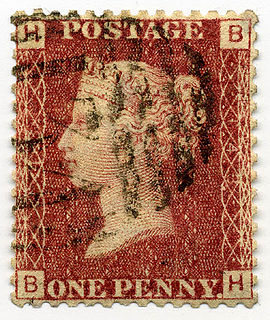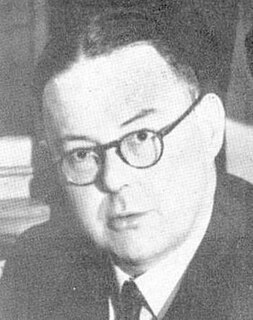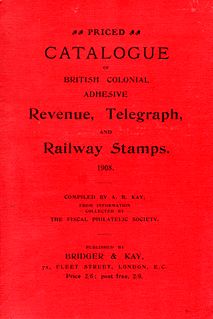
Martin Erler (c. 1920 [1] - 11 August 2014 [2] ) was a German philatelist who was an expert on the revenue stamps of Germany who with John A. Norton (died June 1980 [3] ) wrote the only comprehensive catalogue of German revenue stamps.

Martin Erler (c. 1920 [1] - 11 August 2014 [2] ) was a German philatelist who was an expert on the revenue stamps of Germany who with John A. Norton (died June 1980 [3] ) wrote the only comprehensive catalogue of German revenue stamps.
The first volumes of the Erler catalogue were based mainly on the author's own collections and a 1961 work by John Norton. [4] Later volumes were prepared from the author's research and as new items come on to the philatelic market.
Erler also wrote a number of other works on revenue philately on subjects about which little else has been published and contributed many articles to The American Revenuer, the journal of the American Revenue Association.
Erler was a member of the Royal Philatelic Society London (RPSL) since 1990 and was made a Fellow in 1992. [5] In April 1991, Erler gave a display to the RPSL on the Revenue Stamped Papers in the Wurzburg Area of Northern Bavaria during Napoleonic Times, which was described by Clive Akerman as including material of the "utmost rarity". [6]
Erler has been credited with being one of the individuals who was instrumental in having revenue philately accepted as a distinct competitive class in its own right by the Fédération Internationale de Philatélie. [7]
Erler won awards for his displays of "The Revenue Stamps of Kurhessen (Hesse-Cassel)" at the Bangkok World Philatelic Exhibition [8] and "The Revenue Stamps of the Austro-Hungarian Military Border" at Australia 99. [9]
All co-authored with John Norton except where indicated. Most recent edition shown.
| | This section needs expansionwith: full bibliographic details. You can help by adding to it. (February 2011) |
Erler also produced a number of other books on subjects covered nowhere else:
| | This section needs expansionwith: full bibliographic details. You can help by adding to it. (February 2011) |

Philately is the study of postage stamps and postal history. It also refers to the collection, appreciation and research activities on stamps and other philatelic products. Philately involves more than just stamp collecting or the study of postage; it is possible to be a philatelist without owning any stamps. For instance, the stamps being studied may be very rare or reside only in museums.

This is an overview of the postage stamps and postal history of Australia.
This is a survey of the postage stamps and postal history of the German territory of the Saar. As a border region contested between France and Germany, the Saar has a somewhat complicated philatelic history.

A revenue stamp, tax stamp, duty stamp or fiscal stamp is a (usually) adhesive label used to collect taxes or fees on documents, tobacco, alcoholic drinks, drugs and medicines, playing cards, hunting licenses, firearm registration, and many other things. Typically, businesses purchase the stamps from the government, and attach them to taxed items as part of putting the items on sale, or in the case of documents, as part of filling out the form.

John Harry Robson Lowe was an English professional philatelist, stamp dealer and stamp auctioneer.

The Tuvan People's Republic issued postage stamps between 1926 and 1936. They were popular with stamp collectors in the Western world in the mid-twentieth century because of the obscurity and exoticism of Tannu Tuva and the stamps' quirky, colorful designs. The validity of many stamps purportedly issued by Tannu Tuva has been questioned by philatelists.

Walter Morley (1863-1936) was a pioneering English philatelist, stamp dealer and philatelic author.
Adolph Koeppel was a distinguished American philatelist and author who wrote a number of authoritative works on the revenue stamps of India and Italy that remain the standard works in their areas.

Fritz F. Billig (1902–1986) was a Viennese philatelist and stamp dealer who fled to the United States after the Austrian Anschluss in 1938 and continued his career from Jamaica, New York. There he published a successful and long-running series of philatelic handbooks that are still regularly referred to by philatelists today.
Geoffrey Clive Akerman was an English philatelist. In 2001, Akerman and Gavin H. Fryer won the Crawford Medal from The Royal Philatelic Society London for their work "The Reform of the Post Office in the Victorian Era and Its Impact on Economic and Social Activity". He won numerous other awards for displays at stamp exhibitions. In 2009, Akerman won the Revenue Society Research Medal.
Gary Sidney Ryan (1916–2007) was an eminent philatelist who specialised in the stamps and postal history of Hungary and later in revenue stamps.

The Fiscal Philatelic Society was an early twentieth-century British philatelic society that is seen as a predecessor to today's The Revenue Society. The principal object of the society was the study of fiscal stamps, or, as they are more usually called today, revenue stamps.

Wolfgang C. Hellrigl was an expert on the philately of Nepal and Tibet who in 1994 was invited to sign the Roll of Distinguished Philatelists.

Alexander Berridge Kay was the founder, with E.J. Bridger, of the stamp dealers Bridger and Kay in 1897 or 1898 and a leading figure in the Fiscal Philatelic Society. In 1910, Kay identified used copies of the Italian forgery of the British grey-green Victorian 10 shilling stamp watermarked anchor and perforated 14. His letter to The London Philatelist, published in November 1910, warned the philatelic community of its existence.
The Davies Collection is a collection of Libyan revenue stamps from 1955 to 1969, formed from material from the Bradbury Wilkinson Archive, and presented to the British Library Philatelic Collections by John Neville Davies in 1992.

This is an overview of the postage stamps and postal history of the Free City of Danzig .

Governing authorities in the Philippines have issued a variety of stamps for internal revenue taxes and other fiscal taxes since 1856. Prior to 1856, internal revenues were collected via stamped paper. Revenue stamps for the Philippines were issued by the Spanish East Indies government (1856–1898), the revolutionary government of the First Philippine Republic (1898–1901), the Insular Government of the United States (1901–1935), the government of the Commonwealth of the Philippines, the Philippine Executive Commission (1942–44) and the Republic of the Philippines (1946–present).
Emil Mewes was a German philatelist who was added to the Roll of Distinguished Philatelists in 1992.
Ezekiel Victor Toeg FRPSL was a British solicitor and philatelist who specialised in the postage stamps and postal history of the British West Indies (BWI) and Caribbean. His collection of Antigua won two gold medals at international stamp exhibitions and included a 1693 letter to London that was described in 1990 as the earliest known letter from the island. He wrote a book on the adhesive fees stamps of the Leeward Islands (1991) and completed a survey of the stamps and postal history of the island of Dominica to 1935 (1994). He was president of the British West Indies Study Circle (BWISC) from 1968 until his death in 2010.
John Barefoot is a British philatelist, stamp dealer, and publisher, best known for his catalogues of revenue stamps which are known collectively as the "Barefoot catalogue".